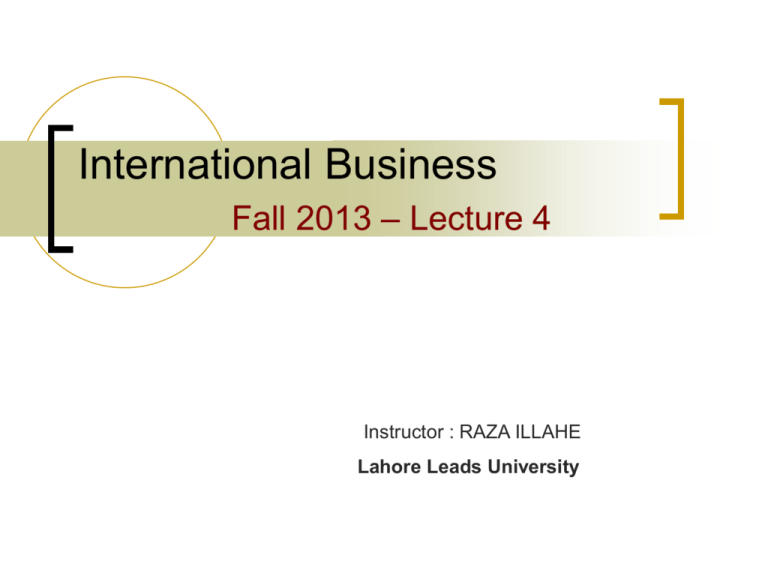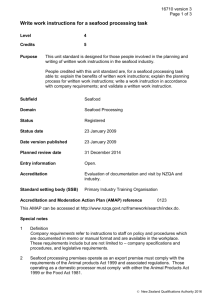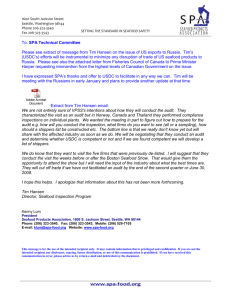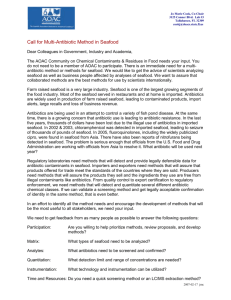International Business-Lecture 4
advertisement

International Business Fall 2013 – Lecture 4 Instructor : RAZA ILLAHE Lahore Leads University Chap 2 ,remaining topic : Factors affecting introduction of Cultural Change Chap 3, Political and Legal Environment Facing Business When companies want to establish their presence in foreign markets, mostly they have to establish some sort of change. Introduction of change usually causes resistance from employees. We can have a look at the factors that affect change. Factors Affecting Introduction of Cultural Change Value systems Cost/benefits of change Resistance to too much change Participation Reward sharing Opinion leadership Timing Learning abroad Value systems : More contradictory to our value, more hard it is to change e.g Eriteria has religious taboos against seafood such as prawns, small fishes etc. Believed to be bad in taste as well. Seafood is abundant. Despite shortage of regular food, they avoided seafood. Officials from Food programme targeted school children to promote seafood habits there. In a matter of 10 or more years, seafood market started to grow. Cost Benefit Analysis: How much benefit a introducing something is costing us? Is the return beneficial? For example ; introduction of rleigious program and fortnightly sermon at a production plant is resulting in better employee commitment and a sense of welfare. Value systems : More contradictory to our value, more hard it is to change e.g Eriteria has religious taboos against seafood such as prawns, small fishes etc. Believed to be bad in taste as well. Seafood is abundant. Despite shortage of regular food, they avoided seafood. Officials from Food programme targeted school children to promote seafood habits there. In a matter of 10 or more years, seafood market started to grow. Cost Benefit Analysis of Change: How much benefit a introducing something is costing us? Is the return beneficial? Resistance to too much change : Change should be a gradual process. Implementation of sudden changes can cause disturbance and annoyance for employees ; resulting in de-motivation. Participation: Discuss proposed changes with stakeholders in advance. This way company may understand how strong the resistance is. They can help stakeholders learn why change is needed and ease fears of change. Employees will be satisfied that thare are consulted and listened to. Reward Sharing: Employees may think that there is no benefit for them for change. It will be helpful to give some reward /bonuses in order to make them try the change or be part of the change. Opinion Leadership: By making use of local people who can influence. For example. Ford wanted to implement U.S production methods in mexico, they brought some non-supervisor employees to U.S and showed them the new system. These workers had more credibility than U.S or Mexican supervisors. Timing : Many well though changes , fail simply because they are introduced at a bad time. A proposed labour saving method ,may make many employees nervous about losing their jobs ,no matter how much management tries to reassure them. If change is introduced at a time when labour is in shortage, then firm may face less resistance and fear. Chapter 3 –Political and Legal Environment Facing Business Chapter 3 –Political and Legal Environment Objectives To discuss the goals and functions of a political system To outline trends in the emergence contemporary political systems To explain the idea of political risk and describe approaches to managing it To understand how political and legal systems affect the conduct of business To describe trends in the evolution and diffusion of contemporary legal systems To discuss the issue of the rule of law versus the rule of man To explain legal issues facing international companies To explain the idea of intellectual property and to discuss areas of concern and controversy Definition of a Political System The complete set of institutions, political organizations, and interest groups of a society Political Ideology The system of ideas that expresses the goals, theories, and aims of a sociopolitical program Most modern societies are pluralistic— different groups champion competing political ideologies Political Ideology Democracy Wide participation by citizens in the decision-making process Political Ideology Totalitarianism A single agent –whether an individual, group or party – monopolizes political power and tries to mobilize people towards two goals Unquestioning support for the official state ideology Opposition to activities that run against the goals of state Trends in Political Systems Engines of democracy: Failure of totalitarian systems to deliver economic progress Improved communication technology Belief that democracy leads to improved standards of living The march towards greater political freedoms and better civil liberties strongly fuelled a sense of inevitability. Collectively these trends stabilized operasting conditions for companies worldwide,supported common rules for int’l competition and paved the way for increased globalisation. Political Risk The risk that political decisions or events in a country negatively affect the profitability or sustainability of an investment Types: Systemic Procedural Distributive Catastrophic Systemic Political Risk Risk that affect all firms because of a change in public policy. Or in other words Risk present for the entire market operating in a particular political system. Examples of Systematic Risk 1. 2. Hugo Chavez of Venezuela felt that some sectors specially oil sector was overly dominated by foreign interests.His government introduced a state policy that preferred collectivism over individualism. Socialists reforms were introduced and many institutions were nationalised especially oil sector. It benefited local interests on the expense of foreign investors. In Argentina the newly elected government liberalised the state-centred economy. Investors who accepted the risk ,prospered in Argentina. Procedural Political Risk It reflects the costs of getting things done because of such problems as government corruption, labor disputes, and/or a partisan judicial system. Distributive Political Risk Reflects revisions in such items as tax codes, regulatory structure, and monetary policy imposed by governments in order to capture greater benefits from the activities of foreign firms. Catastrophic Political Risk Includes those random political developments that adversely affect the operations of all firms in a country. It can arise from specific flashpoints such as ethnic discord, civil disorder or war. Corporate Risk Officers and International Bankers tend to get insurances to protect them from financial consequences of political disorder. Berne Group holds up to $113 billion in political risk. Definition of a Legal System The mechanism for creating, interpreting, and enforcing the laws in a specified jurisdiction Bases of Rules Rule of Man Been around for long period of time The law was the will of the ruler King,Czar,Raja, emperor Today, Chairman, General,Supreme Leader etc. It places ultimate power in hands of one person ,making their will a law no matter how unfair or unjust. This is a keystone of a totalitarian government. Bases of Rules Rule of Law Hallmark of a democratic system Written ,publicly disclosed laws that are adopted and enforced using established procedures. IDEALLY, Rule of law establishes a just environment. Guarantees enforceability of commercial contracts and business transaction. Safeguards personal property and individual freedom. No individual whether government official or private citizen stands above the law. IMPLICATIONS for MANAGERS Many Western companies countries who work under rule of law, face many difficulties in countries where system is more inclined towards rule of man. e.g. In China, legal action taken by foreign firms against local companies that counterfeit their products has proved virtually useless. Writ,threats and lawsuits get trapped in slow legal mechanisms. Usually thrown out on basis of failure to register design “properly” or on some technical grounds. Therefore, uncertainty about the basis of law in a particular country creates challenging situations for managers. Operational concerns that face managers worldwide Employing workers,getting credit,protecting investors,paying taxes,trading across borders,enforcing contracts etc. Managers must be prepared for difference of these procedures in foreign countries. Starting a business In some countries start up procedures are less. e.g. in Brazil it took an entrepreneur 150 days to start a new business. While in U.S in 1 week a company was set up along with bank accounts. Tax,Labour and Administrative declarations. Permits and Licenses from various ministries. 2 Days to start a business in Australia, while on average 77 days in Chad. Operational concerns that face managers worldwide Entering and enforcing contracts With Buyers and Sellers United Nations Conventions on Contracts for Int'l Sale of Goods set guidelines for making and enforcing contracts among businesses. Some countries require highly detailed and lengthy contracts such as in U.K,U.S ,Australia. While in other such as Germany ,Finland shorter and less specific contracts are fine. Enforcement of contract take around 200 days in Russia,South Korea,U.K (the speediest) While 600 to 1500 days for same activities in Italy,Nigeria,Poland. Operational concerns that face managers worldwide Hiring and firing local workers In Practice hiring should be easy and firing should be extremely burdensome. China has very flexible hiring and firing system and has great discretion in setting employment conditions too(work hours,min. wage,benefits). On the other hand, Angola,Belarus and Paraguay have rigid restrictions on firing : company has to provide documentations on the reasons for termination,established detailed firing procedures and furnish both generous prior notifications and payments. Operational concerns that face managers worldwide Closing down the business Some companies fail : and some countries make the task of closing down even more difficult. The English bankruptcy law of 1732. U.S introduced in 1800, while France,Germany and Spain adopted bankruptcy laws in early 19th century. Ireland,Japan,Canada and Hong Kong make closing down business fast and cheap while its slowest and most expensive in India,Philippines,Serbia,Chad,Panama. Operational concerns that face managers worldwide General Relationships Legal code of many countries foster a favourable operating environment including fair taxes, easy access to credit and straightforward employment. The World Bank has a list of countries that according to their criteria are most and least favourable for doing business. According to this list , Singapore is at number 1. Strategic concerns that face managers worldwide Firms have their strategic plans and a country's legal system & basis of rule affect a company's operating decisions such as ,where to manufacture,how to market,how to protect its unique features. Firms must take into account the legal environment. Product safety and liability Companies often customise their products to comply with local legal standards. Standards are sometimes higher, sometimes lower than home country products. e.g. Civic may not have similar safety features in Pakistan as compared to Japan. An electric home appliance may comply to strongest safety tests in U.S while in India, it may not be an issue. Strategic concerns that face managers worldwide Marketplace behavior National Laws also determine what is permitted in pricing,distributing,advertising and promoting products/services. E.g.,Cigarettes ads are prohibited in many countries. Ads targeted at children are banned in some Scandinavian counties. Comparative advertising is not allowed in Germany while Chine prohibits comparison If it portrays negativity. Acceptable market behaviour can be unpredictable where rule of man is basis of rule. e.g bribes for favouritism, manipulated legal charges etc. Strategic concerns that face managers worldwide Legal Jurisdiction A nation's court have the final decision on any matter that falls within their jurisdiction. Usually a company urges a home-country court to claim jurisdiction on the grounds that its likely to receive more favourable treatment. That's why contracts usually contain “choice of law” clauses stipulating the country whose laws will apply to dispute. Strategic concerns that face managers worldwide Arbitration Both parties agree on an Impartial 3rd party to settle disputes. Most arbitration is governed by New York Convention of 1958 that allows parties to choose their own mediators and resolve disputes. Intellectual property Intangible property rights that are a result of intellectual effort Intellectual property rights refer to the right to control and derive the benefits from writing, inventions, processes and identifiers Local attitudes play a large role in piracy











